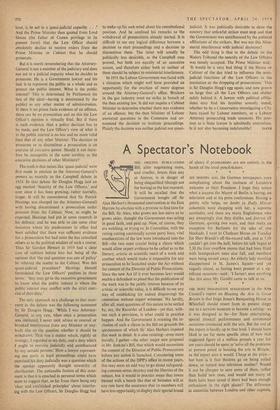A Spectator's Notebook
THE OBSCENE PUBLICATIONS
Bill, after negotiating more, and crueller, fences than any at Aintree, is in danger of being disqualified (though not for boring) at the last moment. It will be recalled that the Government bought off Sir Alan Herbert's threatened intervention in the East Harrow by-election with a promise to find time for the Bill. Sir Alan, who grows not less naïve as he grows older, thought the Government was acting in good faith, and paid up. Now, of course, they are welshing, or trying to. In Committee, with the voting cutting continually across party lines, vital ameliorations of the law were introduced into the Bill—the two most crucial being a clause which would allow expert evidence to be called as to the literary, artistic or scientific merit of a work and another which would make it impossible for any prosecution to be launched under the Act without the consent of the Director of Public Prosecutions. Since the new Act (if it ever becomes law) would enable a defendant to plead that the publication of the work was in the public interest because of its artistic or scientific value, it is difficult to see any way of establishing (or indeed disproving) the contention without expert witnesses. We hardly, after all, want questions of this nature to be settled by, say, the Recorder of London—yet that, with- out such a provision, is what could in practice happen. And the Government is resisting the in- clusion of such a clause in the Bill on grounds the speciousness of which Sir 'Alan Herbert exposed this week in detail. It is also resisting—even more fiercely, I gather—the other major new proposal in Mr. Jenkins's Bill, that which would necessitate the consent of the Director of Public Prosecutions before any action is launched. Considering some of the actions of the DPP's office in recent years, this may seem an odd way to go about safeguard- ing common sense, decency and the liberties of the subject, but it would in practice mean that towns blessed with a bench like that of Swindon will at any rate have the assurance that its members will have less opportunity to display their special brand of idiocy if prosecutions are not entirely in the hands of the local pencil-lickers.






































 Previous page
Previous page